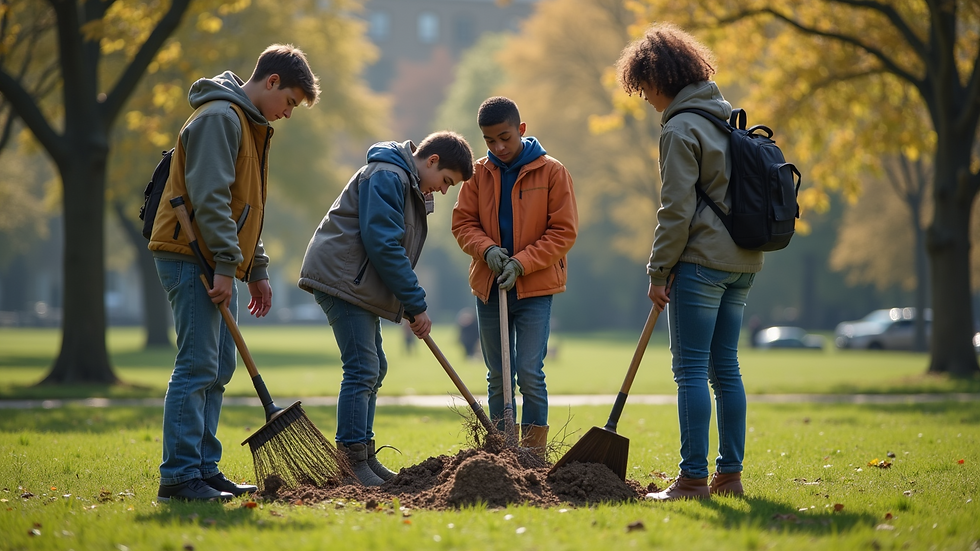How to Teach Teenagers About the Importance of Social Responsibility in Today's World
- hearthiveorg

- Aug 22, 2025
- 3 min read
In a fast-changing world, understanding social responsibility is essential now more than ever. As teenagers go through their formative years, instilling a sense of accountability towards their communities and the environment is crucial.
At Heart Hive Foundation, we are committed to nurturing this sense among young people. This blog post will explore effective strategies for teaching teenagers about social responsibility and how they can make a positive impact.

Understanding Social Responsibility
To effectively teach teenagers about social responsibility, it is vital to define the term clearly. Social responsibility means that individuals and organizations should act in ways that benefit society. This includes recognizing how their actions affect others and the world around them. For instance, studies show that when teens volunteer, they often continue giving back as adults, with 85% citing early experiences as a significant influence on their civic engagement.
Encouraging discussions about current events and pressing social issues can help teenagers connect their actions to broader societal impacts. By learning about environmental challenges or social inequality, they will understand that even small efforts, such as recycling or supporting local businesses, contribute to meaningful change.

Leading by Example
An effective way to instill social responsibility is through leading by example. When teenagers observe adults actively engaged in community service or championing social causes, they are more likely to adopt those behaviors.
At Heart Hive Foundation, we participate in community initiatives ranging from food drives to agriculture. Volunteer efforts—such as local clean-ups or food distributions—show how collective action can make a real impact. Sharing personal stories about how volunteering has made a difference supports the goal of raising compassionate children and can inspire teenagers to take part in similar actions.

Encouraging Empathy
Teaching empathy is essential for grasping social responsibility. Encouraging teenagers to consider others’ perspectives helps them appreciate how their actions impact those around them.
Activities like role-playing different viewpoints or discussing real-life scenarios can enhance their empathy skills. For instance, a discussion about food insecurity can lead them to understand the importance of initiatives like food banks. This understanding enables them to make compassionate choices that provide meaningful aid and positively affect their community.

Providing Opportunities for Involvement
To truly grasp social responsibility, teenagers need chances to get involved. Organizing community service projects, fundraisers, or awareness campaigns can provide valuable hands-on experience.
At Heart Hive Foundation, we actively seek volunteers for various initiatives. We aim to support causes such as local shelters, food drives, and community projects. Inviting teenagers to participate helps them develop a sense of ownership and pride in their contributions, while also nurturing altruism and empathy.

Utilizing Technology for Good
In today’s digital world, technology is a powerful tool for promoting social responsibility. Encourage teens to use social media to raise awareness or organize virtual events.
For example, many teenagers have successfully launched fundraising campaigns on platforms like GoFundMe, raising thousands for causes they care about. By teaching them to use these tools responsibly, they can widen their impact, understand how their online presence matters in real life, and even recognize how their actions can help support a child in need.

Celebrating Achievements
It is crucial to recognize and celebrate teenagers' efforts in promoting social responsibility. Acknowledgment can act as a motivator and inspire further involvement.
Consider creating a recognition program or hosting events to honor their contributions. At Heart Hive, we envision creating opportunities to recognize and celebrate youth volunteers. Highlighting their achievements reinforces the importance of their actions and fosters a culture of giving back.

Final Thoughts
Teaching teenagers about the importance of social responsibility is essential for shaping both their futures and the communities they inhabit. By fostering empathy, offering chances for engagement, and leading by example, we can inspire them to make a meaningful impact.
At Heart Hive Foundation, we are dedicated to nurturing this understanding and encouraging youth to take action. In doing so, we can create a more compassionate and responsible society, one teenager at a time.
By instilling a strong sense of social responsibility in the next generation, we prepare them for adulthood and empower them to drive real change in their communities.
.png)



Comments